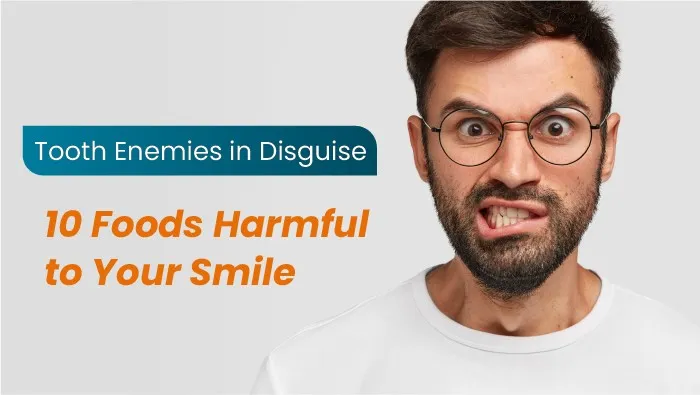Tooth Enemies in Disguise: 9 Foods Harmful to Your Smile
September 14, 2024
Did you know that even if you are very diligent about oral hygiene, you can still cause damage to your teeth by eating the wrong foods?
That's true. Being mindful about what you eat is very essential, if you want to continue having a bright and radiant smile. Certain foods are either acidic in nature, or can cause abrasion or discoloration. Once you start reading the labels of what you're consuming, you will become more aware of ingredients and how they affect your overall health.
Here are some foods and beverages that you should be cautious while consuming, or quit altogether.
Aerated / fizzy drinks and sodas:
A single bottle or can of an aerated beverage can contain as much as 10 to 12 teaspoons of sugar. The high sugar content feeds the bacteria in the mouth, while the acidic nature of the fizz damages the natural enamel of the teeth, causing erosion.
Candies and Chocolates:
Both contain large amounts of sugar, which again increases the bacteria in the mouth, while damaging the enamel - that is actually the hardest surface of the teeth. Excessive consumption of desserts can lead to pits, holes and cavities in the teeth.
It is best to restrict the quantities of candies and chocolates, and ensure that you rinse the mouth thoroughly after having them.
Tea & Coffee:
Though most Indians cannot imagine starting their day without tea or coffee, it is important to know that the caffeine and tannins present in these beverages causes discolouration of the teeth over time. Teeth may look yellowish or light brown over time, and it is recommended that one visits the dentist for a cleaning every few months.
On a daily basis, ensure that you restrict yourself to 2 medium size cups of tea or coffee in a day.
Tobacco / Cigarettes / Gutkha:
Tobacco-based products may give you a temporary high, but the damage they cause to the mouth as well as the lungs is far more dangerous than anything else. From tartar, brownish coloured teeth, ulcers to chronic diseases, tobacco is wrong at every level.
Quitting all tobacco-based products is the only way.
Alcohol:
All alcohol varieties, including wine, have varying levels of acid and pigments, which can stain the teeth and erode the enamel. They also reduce the levels of saliva production, leading to dry mouth and an increased risk of cavities. These will sooner or later lead to tooth decay.
Any form of alcohol can act as an irritant to the soft tissues in the mouth, which can cause gum disease.
Vinegar:
Though there are several recipes that call for vinegar, and many who vouch for the health benefits of consuming raw vinegar in the form of apple cider or similar, one should know that vinegar is highly acidic and corrosive for the teeth. Even when diluted, it can damage tooth enamel and affect oral health.
Rinse your mouth and drink sufficient water if you have consumed vinegar in any form, to wash down its acidic effects, and to avoid enamel erosion and harm.
Paan Masala and Supari (Betel Nut)
Popular mouth fresheners, paan masala and supari (betel nut) in a paan leaf, can do long term damage to the teeth. Though eaten after being chopped, betel nut is hard to chew and can damage the teeth as well as gums. The reddish stain that is left in the mouth and teeth, tends to affect the natural colour of the teeth, while eroding the enamel and building cavities.
If you love having this after every meal, it is safest to just have the plain paan leaf with 'gulkand', made out of natural rose petals. The paan leaf aids digestion, curbs the appetite after a meal, and when eaten along with gulkand becomes a natural cooling agent for the stomach.
It is better to switch to this as a healthier substitute, and always remember to rinse your mouth thoroughly afterwards.
Ice:
There are several kids and grown ups who cannot resist the urge to eat just raw ice, especially during hot summers. While it is made of plain water, the frozen version can wreak havoc on the teeth, causing chips, cracks and even breaks in the enamel. Chewing on hard, cold ice can affect sensitive teeth even more.
All the listed foods may be favourites for several people reading this. The only way to deal with it is practicing caution and restraint, while being extra digilant about oral hygiene (brushing, flossing, rinsing one's mouth and drinking sufficient water) so that you can prevent many complications later on.
If you have any reaction to particular foods, meet your dentist and have it treated immediately.
To know more about foods related to oral health issues from one of our specialists at Apollo, please contact: 18001020288



















































